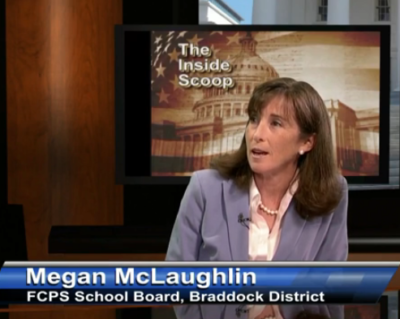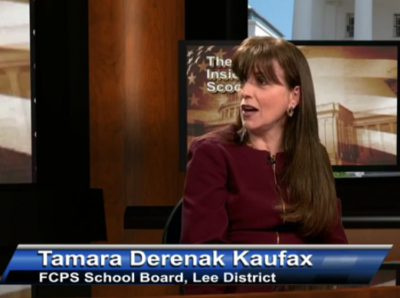Successful Children & Youth Policy Team (SCYPT)
(Oct. 22, 2018) Catherine Read sits down with Megan McLaughlin (Braddock District) and Tamara Denerak-Kaufax (Lee District) of the FCPS School Board. Their wide-ranging discussion covers a variety of topics, but focuses on the work being done by the Successful Children and Youth Policy Team (SCYPT). This joint effort of the Board of Supervisors and the School Board, established in 2013, utilizes a collaborative approach to ensure that children and youth in Fairfax County thrive and reach their fullest potential.
Prior to 2013, the Board of Supervisors and the School Board operated virtually independent of one another, even though there was often overlap in the services that were being delivered. SCYPT was created to bring these two organizations together, and look at services that need to be delivered in a more strategic way. This ensures efficiency in the operations for both agencies. The collaborative approach allows them to be align objectives and initiatives, as well as work together in forming strategic plans and think about shared goals.
Over the past 10 years Fairfax County has seen big changes in demographics. There are pockets of deep poverty in certain regions, which pose challenges to teachers and administrators. FCPS has the goal of offering a world-class education to all students, no matter where they live in the county. In order to do this, the county recognizes that certain needs must be met. For example, children are not able to thrive if they are hungry, or do not have access to medical care. Therefore, part of the SCYTPT program is to identify what the needs are and think about how services are delivered to students and families.
The SCYPT committee is comprised of 2 School Board Members, 2 Board of Supervisors members, local police and community representatives as well as Fairfax County government employees. The committee covers a range of issues, including early childcare and school readiness, racial and social equity, access to mental health resources, attendance policies and the prospect of expanding the use of community schools. They have been very busy since the committee was formed in May of 2013.
Pre-Kindergarten Initiatives
Beginning with some of the youngest students, SCYPT has taken a multi-pronged approach to early childcare and school readiness. They have successfully cut the wait time for student’s access to Pre-K in half. In the last six years FCPS has opened 30 new pre-K classrooms, and they continue to look for any opportunity that they have to expand. They know that for every $1 invested in high quality Pre-K, they can save $10-15 later on the child’s education.
Currently there are 3 ways for Pre-K to be delivered. Students can attend center-based programming in schools funded by Head Start or the Virginia Pre-K initiative, through licensed in-home daycare providers who receive strong support and guidance from the county to ensure that these children are ready for Kindergarten, and private preschool for families who are able to afford this.
For students who are not able to access the centers or in-home programs, FCPS has established a free 3-week “Bridge to Kindergarten” program offered in August of each year, which gives students an introduction to school and a basic education on how to thrive in a Kindergarten classroom.
Attendance and Discipline

Social Services and Mental Health
When considering social services related issues, SCYPT aims to have a wrap-around approach to delivering care. Over the past few years there have been a record-number of cases of students reporting higher levels of stress and anxiety, leading to an uptick in attempted suicides. FCPS is addressing this through a new behavioral health model that employs a multi-pronged approach to this challenge.
Mental health services are delivered in the school by increasing the number of substance abuse counselors, health advisors and contracting with outside providers to help deliver care and to keep students healthy and ready to learn. Programs directed at students are designed to assist them in identifying signs of depression in their friends, and ensure that they know where to turn if that does happen. Additionally, a crisis text line was established so that teens can easily and anonymously access support when they most need it
The school system now runs a Mental Health and Wellness Conference as a resource for students, families and school personnel. The school system is also working side by side with PTA’s to help make sure that they are meeting the ever-changing needs of the community. This wrap-around approach to social services is intentionally designed to meet the students and families where they are and deliver services in a timely and efficient manner.
Community Schools

This year, FCPS and SCYPT is piloting this model in two schools, Mt. Vernon Woods Elementary School and Whitman Middle School, two of the schools in FCPS that are faced with the highest rates of poverty and face some of the biggest challenges. A high percentage of students in these schools are living in poverty and also qualify for ESOL (English Speakers of Other Languages), which pose great challenges to teachers and administrators.
The idea behind this type of approach is that the school and the county would bring wrap-around social services to the families via the school, in order to ensure that they are meeting the needs of these families, as opposed to asking the families to find these services out in the community. It is a shift in mindset, and the work of SCYPT is to bring together the county resources and use them strategically in partnership with the school to make them accessible to children and families.
United Community Ministries is slated to manage the program, and each of the schools will have a community organizer assigned to them. The school system recognizes that the greatest opportunity for upward mobility is through public education. For the most vulnerable students, who are living in poverty and don’t have a strong support network, a community school can offer them the things that they might not be able to find at home. Both McLaughlin and Derenak-Kaufax are excited about this new endeavor and are eager to see positive outcomes in these schools that can be replicated elsewhere in the county.